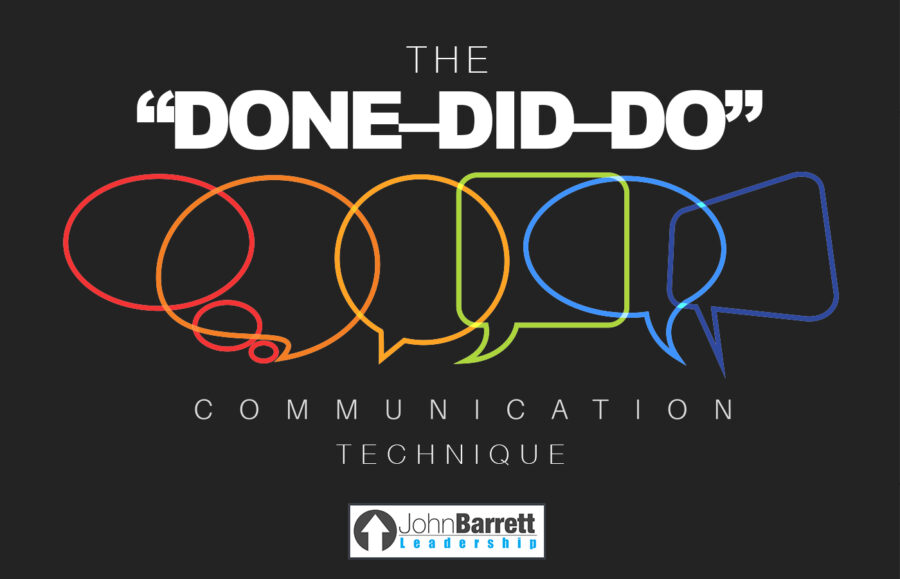The “DONE–DID–DO” Communication Technique
Communicating accountability to a co-worker is one of the hardest things for a leader to navigate. How many times have you said something to someone hoping to be constructive, but then it backfire when you did? Or how many times have you wanted to say something but never did because you were afraid of the backlash? This happens with spouses, kids, bosses, co-workers, and even strangers almost everyday. Somebody does something that is unacceptable, offends, or that crosses a line and we’re not sure of how to handle it.
Most leaders do not navigate confrontation very well. Rarely do leaders get it right when it comes to dealing with accountability issues. They tend to hit the guardrails of either too brash or too passive. They turn to either domination or disintegration, meaning they are seemingly attacking the person or avoided the situation altogether. But if we want to be effective in all that we do we must learn how to communicate well.
So how do you communicate honestly and effectively especially when it could be misunderstood? Here is a great communication technique that will help you be objective, honest, and constructive. I call it the “DONE–DID–DO” technique…Here is the power statement…
“When that was done, it did this to me, and here’s what I would appreciate you do.”
Done
When someone does something that you don’t want them to do or that they shouldn’t have done you need to be honest and objective. So when you approach them be very factual in your account, do not bring in feelings yet. For example if someone makes sarcastic jokes about you to co-workers and it hurt your feelings you could approach them and say, “Hey Jim, when you made that sarcastic remark about my work ethic yesterday at lunch to our co-workers…” That is the start of your phrase. Be very specific about what they have done, don’t be vague or generic. The more specific you are the more they can know what you are talking about. Don’t say, “Hey Jim, you always make jokes about my work ethic to our co-workers…” Bring up a specific instance that you are addressing, even if it frequently happens. When dealing with accountability, the more vague you are the less accountable the person will feel to it.
When dealing with accountability, the more vague you are the less accountable the person will feel to it.
Did
This is the part where you are going to mention how it makes you feel about whatever they have done. Take for example our conversation with Jim who keeps making rude sarcastic remarks about how you work. After you have been specific about what Jim has done you now say, “Hey Jim, when you made that sarcastic remark about my work ethic yesterday at lunch to our co-workers, it made me feel very unappreciated and undervalued with what I am working on for the company…” This is where you are very honest about what their actions did to you. Many times people never understand what their actions do to us because we never communicate how we feel to them. This happens a lot with marriages. A spouse behavior is effecting us negatively, but we never open up to them, therefore they keep doing it because they are unaware of it. You can’t assume people know how you feel if you don’t tell them. Be very honest even if they don’t understand, it’s you that is being effected here, so don’t shy away from that.
You can’t assume people know how you feel if you don’t tell them.
Do
This is the part of the phrase that you become constructive in what you would like them to do next time. You can’t just tell people they hurt you and that it makes you feel bad, you have to give them a target to shoot for in the future. Be specific about what you would like to happen next time. Back to our conversation with Jim. You say, “Hey Jim, when you make that sarcastic remark about my work ethic yesterday at lunch to our co-workers, it made me feel unappreciated and undervalued with what I am working on for the company. I am sure you didn’t mean any harm, but I would really appreciate it if you would not make jokes about how hard I am working in the future.” I always like to start the last section of “DO” with the assumption that the other person probably is unaware of what they did. This is where you don’t blame them, but give them the benefit of the doubt that they were simply oblivious of what they have done and what it did to you. Always start with the assumption that people are innocent, this helps keep them from defending themselves with feeling that you are blaming them. Again, be specific about what behavior you would like to see in the future. Don’t be vague, let them know what your expectation is for the future. If an employee keeps forgetting to get something done and you’ve been asking them for months you may say, “Hey Sally, I have asked you literally more than 5 times in the last 4 weeks to get “task x” done and it is still uncompleted (DONE). When you don’t fulfill my request after the 5th time it makes me think you do not respect my authority enough to take me seriously (DID). I am sure you are not meaning to do this, but next time I need you to get “task x” done after the 1st time I ask please (DO).”
So next time you are dealing with confrontational accountability issues remember the DONE–DID–DO technique and start implementing it to communicate more effectively.









